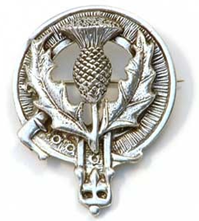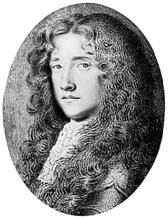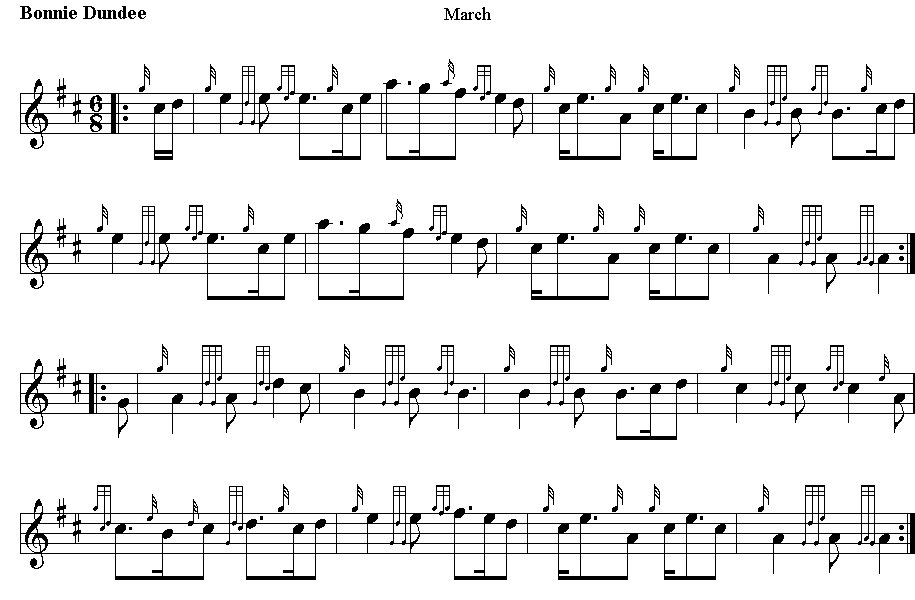
Best viewed in
Internet Explorer
Music (PDF)
Music (BMW)
Back to

Updated
04/25/2013 |
|

Bonnie Dundee |
|
Bonnie Dundee,
better known as John Graham, Viscount Dundee, who died fighting
for the Jacobite cause at the
Battle of Killiecrankie is immortalized in this song.
John Graham of
Claverhouse, 1st Viscount Dundee (c.1648 - July 27, 1689) was a
Scottish soldier and nobleman. Claverhouse is remembered by
history in two distinct characters. Unfavorable records of his
supposed persecution of the Covenanters, when he was responsible
for policing south-west Scotland during and after the
religious unrest and rebellion of the 1670s and 80s, led to
Presbyterian historians dubbing him "Bluidy Clavers". Later, as
a general in the Scottish army, Claverhouse remained loyal to
King James VII after the so-called Glorious Revolution of 1688.
He rallied the loyal Highland
clans and, although he lost his life in the battle, led them to
victory at Killiecrankie. This first Jacobite rising was
unsuccessful, but Claverhouse became a Jacobite hero, acquiring
his second soubriquet "Bonnie Dundee".
The
song is based on a poem by Sir Walter Scott about the Battle of
Killicrankie. The Battle of Killiecrankie was fought on July
27, 1689 chiefly between highland Scottish clans supporting
James II and VII and government troops supporting William of
Orange during the Glorious Revolution. About one-third of the
highlander force was killed. Dundee
was fatally wounded at the very beginning of the battle.
Although it was a stunning victory for the Jacobites, it had
little overall effect on the outcome of the war and with their
leader dead, their forces were scattered at the Battle of
Dunkeld the next month.
|
|
 |
|
Lyrics
|
To the Lords
o' Convention 'twas Claverhouse spoke
E'er the King's crown go down there are
crowns to be broke
So each cavalier who loves honor and me
Let him follow the bonnets o' Bonnie
Dundee
Chorus:
Come fill up my cup, come fill up my can
Come saddle my horses and call out my
men
Unhook the West Port and let us gae free
For it's up with the bonnets o' Bonnie
Dundee
Dundee he is
mounted and rides up the street
The bells they ring backward, the drums
they are beat
But the provost douce man says just let
it be
For the toon is well rid o' that devil
Dundee
Chorus:
|
There are
hills beyond Pentland and lands beyond
Forth
Be there lords in the south, there are
chiefs in the north
There are brave downie wassles three
thousand times three
Cry hey for the bonnets o' Bonnie Dundee
Chorus
And awa tae
the hills, tae the lee and the rocks
Ere I own a userper I'll couch with the
fox
So tremble false whigs in the mid'st o'
yer glee
For ye've no seen the last o' my bonnets
and me
Chorus |
During the
American Civil War traditional English,
Irish, and Scottish songs were often sung or
modified. The Confederates did this very
often. The song Riding a Raid takes
place during the 1862 Antietam Campaign.
J.E.B. Stuart's Confederate cavalry set off
on a screening movement on the flank of
Robert E. Lee's army in order to give Lee
time to prepare his army to meet the Union
army after Northern general George McClellan
had gained information on Lee's location and
plans. The Campaign would culminate in the
battle of Antietam, or Sharpsburg as the
Confederates called it. This would be the
bloodiest day in American history and while
the battle was indecisive, Lee was forced to
abandon any hope of continuing the campaign.
Lyrics
'Tis old
Stonewall the Rebel that leans on
his sword,
And while we are mounting prays low
to the Lord:
"Now each cavalier that loves honor
and right,
Let him follow the feather of Stuart
tonight."
Chorus:
Come tighten your girth and
slacken your rein;
Come buckle your blanket and holster
again;
Try the click of your trigger and
balance your blade,
For he must ride sure that goes
riding a raid.
Now gallop,
now gallop to swim or to ford!
Old Stonewall, still watching, prays
low to the Lord:
"Goodbye, dear old Rebel! The
river's not wide,
And Maryland's lights in her window
to guide."
Chorus:
|
There's a man in
the White House with blood on his
mouth!
If there's knaves in the North,
there are braves in the South.
We are three thousand horses, and
not one afraid;
We are three thousand sabres and not
a dull blade.
Chorus:
Then gallop,
then gallop by ravines and rocks!
Who would bar us the way take his
toll in hard knocks;
For with these points of steel, on
the line of the Penn
We have made some fine strokes --
and we'll make 'em again
Chorus:
|
|
|
|
|



